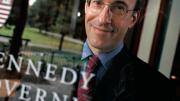As the American under-21 chess champion, Kenneth S. Rogoff decided to "miss most of the last two years of high school." He left Rochester, New York, to support himself in Yugoslavia on prize winnings—perhaps an inkling of his international interests. Yale accepted his equivalency diploma; in college he played chess summers only (placing no lower than seventh in three U.S. Championships), indulging instead a new passion, economics, in which he was taught by future Nobel laureate James Tobin. Thereafter, Rogoff dropped out of MIT to play chess until he quit (cold turkey) to earn a Ph.D. in 1980. Professor of economics at Harvard since 1999, he has pursued "problems at the intersection of political economy and economics," a phenomenon he saw firsthand during two years on leave as chief economist and research director of the International Monetary Fund, ending last fall. He has documented the "political budget cycle": governments' willingness to raise taxes, for example, relative to the electoral calendar, and "why voters fall for it." His interpretation of international debt (more symptom than cause of developing countries' weak growth) extends to speculation on "why countries like the U.S. can borrow enough to wrap a rope around their necks several times" while others cannot secure credit. As the new director of Harvard's Center for International Development, he will focus research on "the big problem for the world over the next 100 years": that two billion people are poor although "our world is a cornucopia." On the home front, filmmaker Natasha Rogoff pioneered the Russian Sesame Street, but International Grandmaster Kenneth will teach children Gabriel, seven, and Juliana, five, the basic chess moves.
Kenneth S. Rogoff
Kenneth S. Rogoff
Kenneth S. RogoffPhotograph by Jim HarrisonAs the American under-21 chess champion, Kenneth S. Rogoff decided to "miss most of the last two...

Explore More From Current Issue

Rabbi, Drag Queen, Film Star
Sabbath Queen, a new documentary, follows one man’s quest to make Judaism more expansive.

The True Cost of Grade Inflation at Harvard
How an abundance of A’s created “the most stressed-out world of all.”

How Stories Help Us Cope with Climate Change
The growing genre of climate fiction offers a way to process reality—and our anxieties.


